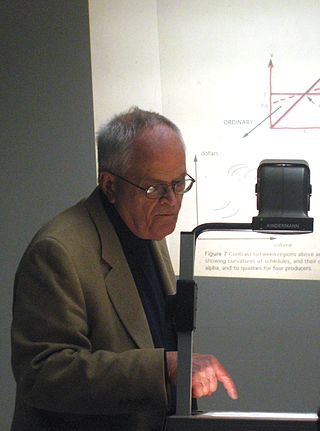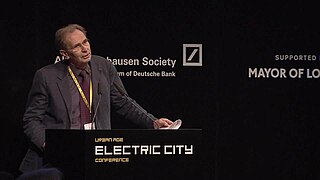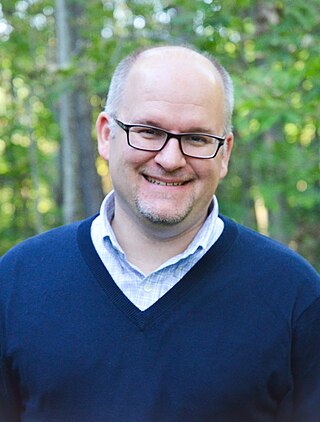William Julius Wilson is an American sociologist, a professor at Harvard University, and an author of works on urban sociology, race, and class issues. Laureate of the National Medal of Science, he served as the 80th President of the American Sociological Association, was a member of numerous national boards and commissions. He identified the importance of neighborhood effects and demonstrated how limited employment opportunities and weakened institutional resources exacerbated poverty within American inner-city neighborhoods.

James Samuel Coleman was an American sociologist, theorist, and empirical researcher, based chiefly at the University of Chicago.
John Harry Goldthorpe is a British sociologist. He is an emeritus Fellow of Nuffield College, Oxford. His main research interests are in the fields of social stratification and mobility, and comparative macro-sociology. He also writes on methodological issues in relation to the integration of empirical, quantitative research and theory with a particular focus on issues of causation.

Harrison Colyar White is the emeritus Giddings Professor of Sociology at Columbia University. White played an influential role in the “Harvard Revolution” in social networks and the New York School of relational sociology. He is credited with the development of a number of mathematical models of social structure including vacancy chains and blockmodels. He has been a leader of a revolution in sociology that is still in process, using models of social structure that are based on patterns of relations instead of the attributes and attitudes of individuals.

Craig Jackson Calhoun is an American sociologist, currently University Professor of Social Sciences at Arizona State University. An advocate of using social science to address issues of public concern, he was the Director of the London School of Economics and Political Science from September 2012 until September 2016, after which he became the first president of the Berggruen Institute. Prior to leading LSE, Calhoun led the Social Science Research Council, and was University Professor of the Social Sciences at New York University and Director of NYU's Institute for Public Knowledge. With Richard Sennett he co-founded NYLON, an interdisciplinary working seminar for graduate students in New York and London who bring ethnographic and historical research to bear on politics, culture, and society.

John Richard Urry was a British sociologist who served as a professor at Lancaster University. He is noted for work in the fields of the sociology of tourism and mobility.

John David Brewer HDSSc, MRIA, FRSE, FAcSS, FRSA is an Irish-British sociologist who was the former President of the British Sociological Association (2009–12), and has been the Professor of Post Conflict Studies in the Senator George J. Mitchell Institute for Global Peace, Security and Justice at Queen's University Belfast (2013–present), Honorary Professor Extraordinary, Stellenbosch University (2017–present) and Honorary Professor of Sociology, Warwick University (2021–present). He was formerly Sixth-Century Professor of Sociology at the University of Aberdeen (2004–13). He is a member of the United Nations Roster of Global Experts for his work on peace processes (2010–present). He was awarded an honorary doctorate in 2012 from Brunel University for services to social science.

Michèle Lamont is a Canadian sociologist who is the Robert I. Goldman Professor of European Studies and a professor of Sociology and African American Studies at Harvard University. She is a contributor to the study of culture, inequality, racism and anti-racism, the sociology of morality, evaluation and higher education, and the study of cultural and social change. She is the recipient of the Gutenberg Award and the Erasmus award, for her "devoted contribution to social science research into the relationship between knowledge, power, and diversity." She has received honorary degrees from five countries. and been elected to the British Academy, Royal Society of Canada, Chevalier de l’Ordre des Palmes Academiques, and the Sociological Research Association. She served as president of the American Sociological Association from 2016 to 2017.

The University of Nottingham is a public research university in Nottingham, England. It was founded as University College Nottingham in 1881, and was granted a royal charter in 1948. The University of Nottingham belongs to the research intensive Russell Group association.
Sue Scott is a British sociologist and feminist whose research has focused primarily on sexuality, gender and risk. She is a visiting professor at the University of Newcastle and an honorary professor at the University of Helsinki. From 2013–2019 she was honorary professor in the Centre for Women's Studies at the University of York. She was president of the British Sociological Association 2007–2009 and president of the European Sociological Association 2017–2019. She is a co-founder and managing editor of the Social Science Research Magazine Discover Society.
Krishan Kumar is a British sociologist who is currently William R. Kenan, Jr., Professor of Sociology at the University of Virginia.

The sociology of race and ethnic relations is the study of social, political, and economic relations between races and ethnicities at all levels of society. This area encompasses the study of systemic racism, like residential segregation and other complex social processes between different racial and ethnic groups.

John Peter Scott is an English sociologist working on issues of economic and political sociology, social stratification, the history of sociology, and social network analysis. He is currently working independently, and has previously worked at the Universities of Strathclyde, Leicester, Essex, and Plymouth. He is a Fellow of the British Academy, a Fellow of the Royal Society of Arts, and a Fellow of the Academy of Social Sciences. He has been a member of the British Sociological Association since 1970. In 2015 he became Chair of Section S4 of the British Academy. In 2016 he was awarded an Honorary Doctorate of Essex University.
Mauro F. Guillén is a Spanish/American sociologist, political economist, management educator. In March 2021 he was announced as the new Director (Dean) of the Cambridge Judge Business School, and a Fellow of Queens' College at the University of Cambridge before resigning in 2023 to return to his family and his professorship at Wharton. Until July 2021, he was the Zandman Professor at the Wharton School of the University of Pennsylvania, and Director of the Penn Lauder Center for International Business Education and Research (CIBER). He was the Anthony L. Davis Director of the Joseph H. Lauder Institute of Management and International Studies from 2007 to 2019. He is the Wall Street Journal bestselling author of 2030: How Today's Biggest Trends Will Collide and Reshape the Future of Everything (2020).

David Alfred Martin, FBA was a British sociologist and Anglican priest who studied and wrote extensively about the sociology of religion.

Stephen Lawrence Morgan is a Bloomberg Distinguished Professor of Sociology and Education at the Johns Hopkins University School of Arts and Sciences and Johns Hopkins School of Education. A quantitative methodologist, he is known for his contributions to quantitative methods in sociology as applied to research on schools, particularly in models for educational attainment, improving the study of causal relationships, and his empirical research focusing on social inequality and education in the United States.
Joseph Ben-David was a Hungarian-born Israeli sociologist who was a pioneer in the sociology of science.
Gurminder K. Bhambra is a British sociologist, theorist, and public intellectual specialising in postcolonial and global historical sociology. Her current work focuses on epistemological justice and reparations. While her research primarily focuses on global historical sociology, she is also interested in the intersection of the social sciences.

Pepka Boyadjieva is Professor of Sociology at the Institute of Philosophy and Sociology, Bulgarian Academy of Sciences. Chair of the Scientific Council of the Institute for the Study of Societies and Knowledge and of Institute of Philosophy and Sociology. Vice-Chair of the General Assembly of the Bulgarian Academy of Sciences ; President of the Bulgarian Sociological Association. Expert for the European Commission and Permanent Senior Fellow at Center for Advanced Studies, Sofia. Member of the Editorial Board of the International Sociological Association’s edition Sage Studies in International Sociology, Board Member of International Journal of Lifelong Education since 2008 and of Journal of Social Science Education since 2009. Honorary Professor of Sociology of Education at the University of Nottingham; Professor of Sofia University and New Bulgarian University. Her research interests are in the fields of inequalities in education; social justice and education; education, science and social modernization; university and society; lifelong and adult learning; public representation and images of science and scientists.












